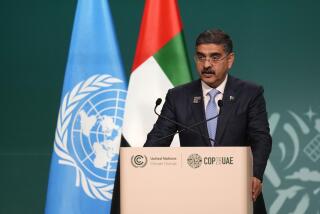Karzai Claims Brotherly Ties With Pakistan
- Share via
ISLAMABAD, Pakistan — Afghanistan’s President Hamid Karzai paid a call on Pakistani leaders Tuesday and described relations between their two nations as brotherly -- despite continuing border violence and claims by the Afghan and U.S. militaries that Pakistan is too lenient with terrorists who use its territory as a haven.
Karzai’s visit capped one of the most tension-filled weeks in the countries’ relations since a U.S.-led coalition of foreign and Afghan troops drove the ruling Taliban from power in Afghanistan in late 2001. The week began with an exchange of shelling and rocket fire April 16 after Afghan militia members ventured into disputed territory.
Since the Taliban was defeated, remnants of the regime and of Osama bin Laden’s Al Qaeda terrorist network have hidden in the rugged, unsettled and often ill-defined tribal areas that separate the two nations. The guerrillas stage forays into Afghan territory to harass and rocket U.S. patrols.
Although Pakistan has stationed 70,000 additional troops along the frontier, U.S. Army Lt. Gen. Dan K. McNeill, who leads the coalition forces in Afghanistan, has repeatedly charged that Islamabad does not adequately police its border.
Underscoring the severity of the situation, Zalmay Khalilzad, the U.S. special representative to Afghanistan, visited Pakistani Foreign Minister Mian Khursheed Mehmood Kasuri here last week partly to stress the importance of a secure border with Afghanistan.
After that visit, Khalilzad told reporters in the Afghan capital of Kabul that he had warned Pakistan that anything that undermined the stability of the Karzai administration would be perceived by Washington “as a threat to its interests.” Kasuri expressed concerns about what he said were Afghan incursions into Pakistan but said his country would not allow its territory to be used by anti-Karzai forces.
The Afghan Foreign Ministry had issued a release before the meeting saying that border security and the fight against terrorism would be high on the agenda. However, at a news conference Tuesday, after talks with Pakistani Prime Minister Mir Zafarullah Khan Jamali, Karzai said that the border flare-ups did not come up in their discussion.
Rather, Karzai said the topics discussed included increasing the two countries’ trade relations, police training and adding flights to Kabul by Pakistan International Airlines.
Incidents like the one April 16 can happen between neighbors and will not affect the two countries’ good relations, said Karzai, who also met Tuesday with Pakistani President Pervez Musharraf.
Fundamentalist tribal leaders on Pakistan’s side of the border have in the past expressed sympathy with the Taliban, a sympathy that many in the U.S. military believe translates into cooperating with and providing a haven for remnants of the Taliban and of Al Qaeda, to which it once played host.
Pakistani Foreign Ministry spokesman Aziz Ahmed Khan said Tuesday claims that border skirmishes were sanctioned by Pakistan are false and have been “planted by vested interests.” The April 16 incident involved a “misunderstanding over unmarked territory which Pakistan has since proved belonged to it,” he said.
“We want peace and stability in Afghanistan,” Khan said, “and we are a signatory to the Bonn agreement” of December 2001, which outlines an international commitment to Afghan sovereignty and recovery from 23 years of warfare. Pakistan has also captured dozens of terrorism suspects, he said, including top Al Qaeda operative Khalid Shaikh Mohammed in Rawalpindi last month.
Afghan Brig. Gen. Gul Haidar, who leads Ministry of Defense troops in the seven southern provinces, is unpersuaded. He said in an interview in Kabul on Tuesday that Pakistani “cooperation” with renegade Afghan terrorists is what makes the border forays possible.
“Pakistan is interfering because they don’t want peace, they don’t want Afghan reconstruction. They only seek their own interests,” said Haidar.
Each country claims its troops were fired on first April 16 when Afghan militia troops entered an area that both claim. Pakistani officials described it as lying within the boundaries of North Waziristan tribal agency. Machine-gun fire and mortar rounds were exchanged. Afghan commanders in the southeastern province of Khowst say Pakistani troops later crossed into Afghan territory.
Parts of the mountainous terrain along the border have been in dispute ever since 1893, when the so-called Durand Line was drawn by British colonial rulers.
Pakistan supported the Taliban during its five-year reign and near its end was the only foreign nation to give it diplomatic recognition. But after the Sept. 11 terrorist attacks, Islamabad joined the U.S. war on terrorism, even allowing U.S. aircraft to use three of its bases for sorties against the Taliban.
Still, no one doubts that the Taliban and possibly renegade warlord and former Afghan Prime Minister Gulbuddin Hekmatyar have the strength and resources to carry out operations.
On April 14, coalition forces in the border area uncovered an arms cache in two adjacent caves, believed to have been stored there by terrorists. The cache amounted to more than 21 tons and included thousands of rockets and more than 1 million rounds of ammunition.
Also Tuesday, Karzai promised to release dozens of Pakistani terrorist suspects still captive in Afghanistan as soon as their identities can be ascertained. Jamali, for his part, promised to release a significant of number Afghans held in Pakistani jails on petty charges.
*
Times staff writer Kraul reported from Kabul and special correspondent Zaida from Islamabad.
More to Read
Sign up for Essential California
The most important California stories and recommendations in your inbox every morning.
You may occasionally receive promotional content from the Los Angeles Times.










